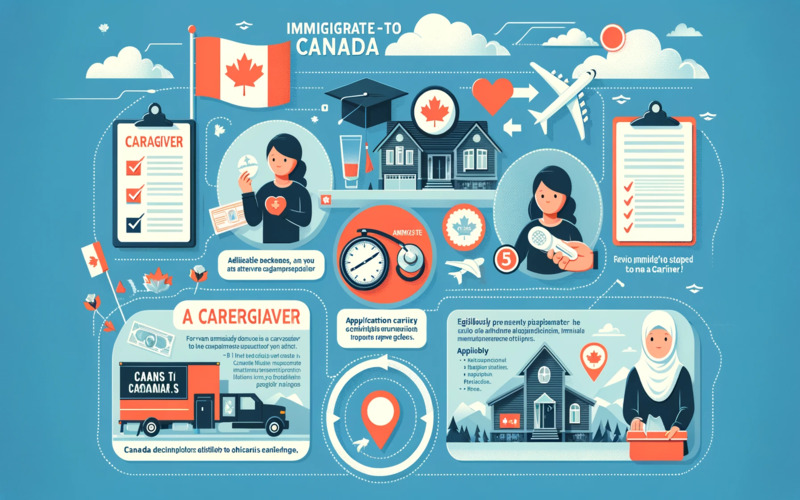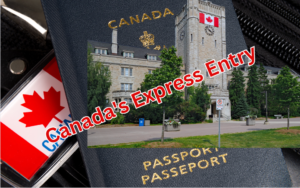Table of Contents
Are you interested in beginning a chapter of your life in Canada as a caregiver? This comprehensive guide will be your step towards realizing that aspiration. Canada, renowned for its policies and diverse culture presents an exceptional opportunity for caregivers worldwide. The process of relocating to Canada in this role involves comprehending programs fulfilling specific requirements and adjusting to a different way of life. Throughout this guide we will explore all these facets to ensure you possess a roadmap for your journey to Canada.
Canada is more than a country; it is a community that highly values the contributions made by caregivers. These remarkable individuals play a role in supporting Canadian families by providing care for children, the elderly or individuals with disabilities. The caregiver programs within the country are specifically designed to facilitate the immigration process for caregivers while ensuring they have a nurturing environment to thrive in. Let us now delve into the specifics of making your transition to Canada as smooth and successful as possible.
Understanding the Canadian Caregiver Program
The Canadian Caregiver Program comprises two categories; the Home Child Care Provider Pilot and the Home Support Worker Pilot. Both programs offer pathways towards obtaining residency, for caregivers who meet specific criteria.
The Home Child Care Provider Pilot is specifically designed for individuals who plan to provide in-home care for children under 18 years old. To be eligible for this program applicants need to have a job offer in Canada and meet work experience criteria.
On the other hand the Home Support Worker Pilot is tailored towards those who provide care for elderly individuals or people with disabilities. This program also requires a job offer and relevant work experience. One notable advantage of these programs is that they allow caregivers to bring their family members to Canada and provide a pathway to residency – a feature that is not commonly offered by many other temporary work programs. It’s important to understand the details of each program in order to determine which path aligns better with your qualifications and career goals.
Eligibility Criteria
To qualify for the Canadian Caregiver Program, the first step is meeting the requirements, which involve having completed at least a high school education equivalent in Canada. This criterion ensures that caregivers possess a level of education necessary for their role and integration into Canadian society.
Language proficiency is also a requirement. Caregivers must demonstrate a command of either English or French which are Canadas official languages. Typically language proficiency is assessed through tests, like IELTS or TEF Canada.
Being proficient in one of these languages is not just beneficial for your role but it also helps you adapt to life in Canada. Moreover applicants must have at least one year of full time work experience as a caregiver or in a related field. It’s crucial that this experience has been acquired within the three years before applying to ensure that your skills are up to date.
Application Process
Moving to Canada as a caregiver involves a well prepared application process. The first step is gathering all the documents, including educational certificates, language test results, work experience records and a valid job offer from a Canadian employer. It’s essential to ensure the accuracy and completeness of these documents as any incorrect information may cause delays or result in the rejection of your application.
Once you have all your documents arranged properly the next step is to submit your application. You can do this online through the Immigration, Refugees and Citizenship Canada (IRCC) website. After submission you will enter into a waiting period where processing times for caregiver applications can vary and often take months. During this time it’s important to be patient and stay updated on the status of your application.
It’s also an idea to use this time to get ready for your move. This includes doing research on finding a place to live learning about culture and planning your finances.
Finding a Job in Canada

Getting a job in Canada as a caregiver can be challenging. It’s an important part of the process. Building connections and networking are key when searching for employment. Online platforms like LinkedIn can be helpful for connecting with caregivers, joining relevant groups and forums and getting leads on job opportunities.
Understanding how your qualifications from another country are recognized in Canada is also crucial. Sometimes you may need to go through an assessment process to validate your credentials. The specifics of this process can vary depending on where you received your education and the province where you plan to work. Additionally, customizing your resume and cover letter for the job market is important. Highlighting your skills and experience will show Canadian employers that you understand the responsibilities of being a caregiver.
Adjusting to Canadian Culture
Moving to a country means more than just changing locations; it also involves adapting to a new culture. Canada is known for its politeness, diversity and values. Understanding these norms and values is important as you integrate into Canadian society.
To make your transition to Canada smoother and more enjoyable it’s important to learn about customs, holidays and everyday practices. You should also consider the climate especially if you’re coming from a warmer country. Canadian winters can be tough with snowfall and low temperatures.
It’s crucial to prepare for this weather change by investing in clothing and understanding how to navigate daily life during the winter months. Additionally adapting to the lifestyle, which may involve different work life balance practices, dietary habits and leisure activities is part of the journey. Approaching these changes with a mind will help you settle in more comfortably.
Legal Considerations
It’s essential to have an understanding of the legal aspects of working as a caregiver in Canada. This includes being aware of the work permits and visas applicable to caregivers. The Canadian government provides visas for caregivers through the Temporary Foreign Worker Program allowing them to work in Canada for a specific period. Familiarizing yourself with the terms and conditions attached to these permits is crucial for ensuring compliance with immigration laws.
Equally important is knowing your rights as a worker in Canada. This includes wages, safe working conditions and protection against exploitation. Canada has labour laws that are designed to safeguard workers rights including those of caregivers.
It is essential to familiarize yourself with these laws and know where to seek assistance if your rights are violated. This knowledge is crucial for your well being and success in Canada.
Healthcare and Social Benefits
One of the advantages of living and working in Canada is having access to its healthcare system, which is considered among the best globally. As a caregiver it’s important to understand how you can access healthcare services, such as registering for health insurance in the province where you reside. This insurance generally covers basic health services but its important to be aware of what it includes and excludes.
Social security benefits are another aspect to consider. Canada offers social programs that can be highly beneficial particularly for newcomers. These programs include employment insurance, the Canada Child Benefit for individuals with children well as other social assistance programs. Understanding these benefits and knowing how to access them can provide support as you settle into your new life in Canada.
Accommodation and Living Expenses
Finding accommodation is one of the initial steps upon arriving in Canada. You have options ranging from renting an apartment to shared housing depending on your budget and preferences.
When you’re researching the housing market in the area where you plan to live it’s important to understand the costs and be aware of your rights as a tenant. Websites like Kijiji, Craigslist or local real estate listings can provide information.
Managing your living expenses is another aspect to consider when relocating. The cost of living in Canada varies depending on the city or region with larger cities like Toronto and Vancouver being more expensive. It’s essential to budget for expenses such as groceries, transportation, utilities and personal items. Additionally, getting acquainted with the banking system and financial services is important since they play a significant role in managing your finances while in Canada.
Family Sponsorship and Permanent Residency
For caregivers obtaining permanent residency in Canada and potentially sponsoring family members to join them is their ultimate goal. The caregiver programs offer pathways to residency if certain conditions are met, such as working a specific number of hours and/or years in Canada. Understanding these requirements and planning your career accordingly are steps toward achieving this goal.
Once you’ve obtained residency status you may have the opportunity to sponsor your spouse, partner and dependent children for immigration, to Canada.
To successfully sponsor your family members in Canada you will need to demonstrate your stability and ability to support them. It’s important to have an understanding of the application process the required documentation and the expected processing times so that you can plan effectively.
Challenges and Solutions
When you move to a country and start a new job as a caregiver in Canada it’s natural to face certain challenges. These may include feeling homesick dealing with differences, language barriers and adjusting to the Canadian work environment. It’s crucial to acknowledge these challenges and reach out for support when needed. Fortunately there are communities and organizations in Canada that offer services specifically designed for newcomers like language classes programs for cultural integration and workshops for professional development.
In order to make the transition smoother it’s helpful to develop coping strategies such as staying connected with your culture, making friends and participating in community activities. Remember that adapting to a country takes time and it’s completely normal to feel overwhelmed at times. Seeking support from others and being patient with yourself while navigating through these changes is key to achieving success in Canada.
Networking and Community Involvement

To better adjust to life in Canada, one of the effective approaches is getting involved in networking opportunities and engaging with the local community. By joining associations or groups related to your heritage background you can establish a sense of belonging while also maintaining connections with your roots.
These organisations often organize events and activities providing a chance to meet new people and make friends.
Another great way to integrate into your community is through volunteering. It not only allows you to develop new skills and improve your language abilities but also helps you build valuable connections. Many cities in Canada have volunteer centres and online platforms where you can find opportunities that align with your interests and schedule.
Further Education and Career Advancement
Canada highly values education offering avenues for further learning and career advancement. As a caregiver you may want to consider upgrading your skills or pursuing education in healthcare or related fields. This can open doors to job prospects and enhance your chances of professional growth.
Numerous educational institutions in Canada offer programs specifically tailored for professionals like yourself. These programs assist in adapting your existing qualifications to the context. Additionally exploring opportunities for career advancement within your field of work can lead to rewarding roles with better pay down the line.
Preparing for the Move
Preparing for your move to Canada involves more than packing up your belongings. Creating a checklist of tasks to complete before. After arrival will help ensure a seamless transition.This involves making arrangements for your accommodation upon arrival, understanding the transportation options available in your city and setting up essential services such as a bank account and mobile phone.
It’s also important to be mentally prepared for the move. This means having expectations being open to new experiences and approaching challenges with a positive mindset. Remember, relocating to a country is a major life change so it’s natural to take some time to adjust.
In conclusion
Embarking on the journey of moving to Canada as a caregiver is both exciting and challenging. It requires planning, preparation and adaptability. By familiarizing yourself with the caregiver program meeting the eligibility criteria, navigating through the application process and integrating into society you can turn this dream into a reality. Always remember that patience, perseverance and embracing experiences are key factors in achieving success.
Canada is a country that offers opportunities for caregivers. With its immigration policies, diverse culture and high quality of life it serves as an ideal destination for those seeking to build a rewarding career and life. We hope that this guide has provided you with insights and tips for your journey to Canada, as a caregiver.
FAQs
How can I prove my language proficiency for the Canadian caregiver program?
- Language proficiency can be demonstrated through standardized tests like IELTS or TEF Canada. It’s important to achieve the required scores as specified by the caregiver program.
Is it possible to work in a different field once I move to Canada as a caregiver?
- While the caregiver program is specific to caregiving roles, obtaining permanent residency can open up opportunities to pursue different career paths in Canada.
What should I do if I face discrimination or unfair treatment in my role as a caregiver in Canada?
- Canada has laws protecting workers from discrimination and unfair treatment. If you encounter such issues, it’s important to report them to the appropriate authorities or seek legal advice.
How long does it typically take to obtain permanent residency through the caregiver program in Canada?
- The time frame for obtaining permanent residency can vary depending on individual circumstances and program requirements. It typically involves several years of working as a caregiver in Canada.
Can I access healthcare services immediately upon arriving in Canada as a caregiver?
- Access to healthcare services may depend on the province you live in and your immigration status. It’s important to research and understand the healthcare system in the province you plan to reside in.
Disclaimer:
This article is for informational purposes only and not financial advice. Please do your own research or consult a professional before making financial decisions. The writer and publisher bear no responsibility for any potential losses or damages. Any reliance you place on information from canadaeasily.com is strictly at your own risk. Please read our Terms of Service for more information.





Pingback: How to Move to Canada Directly from Nigeria: A Comprehensive Guide - CanadaEasily